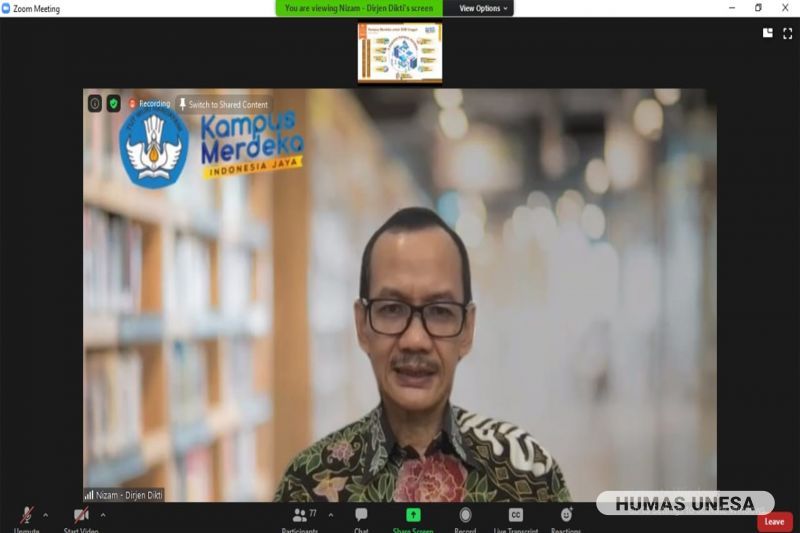
www.unesa.ac.id
Unesa.ac.id, Surabaya-Key Partner, Initiative of the United States Agency for International Development (USAID) for inclusive employment in Indonesia held a media gathering with the theme “Entrepreneurship and Youth Development for Inclusive Employment” with the Ministry of Education, Culture, Research. and Technology of the Republic of Indonesia (Kemendikbudristek RI) on Wednesday (16/6/2021).
Prof. Ir. Nizam, M.Sc., Ph.D., IPM., ASEAN Eng., Director General of Higher Education Kemendikbudristek RI who was also present on the occasion stated that students need entrepreneurship programs on campus as an effort to improve the quality of human resources so that later they can become the backbone of development through the nation's economic independence. "Students can be the driving force of the nation's economy after the pandemic and support the Free Learning and Independent Campus policies," he said
He continued that there were four leading activities echoed in the MBKM program. There are entrepreneurship workshops, Indonesian student management business activities (KBMI), Indonesian student start-up acceleration (ASMI), Indonesian student entrepreneurship assistance (PWMI) and a holistic village development and empowerment program (PHP2D).
Meanwhile, Lensi Mursida from USAID Mitra Kunci explained about the Real Work Lecture program and Entrepreneurship Thematic Field Work Practices (KKN and PKL TKWU). He added that the main activities in the program were the development of curriculum models and entrepreneurship development, development of the TKWU KKN module, and training of field supervisors and students.
In addition, there are also implementation and documentation programs, and the development of e-learning for TKWU KKN through the Indonesian Online Learning System (SPADA). This SPADA can be used not only by students but also by the public.
In the program, added Lensi, there are already around seven partner universities and polytechnics with a total of 33,816 students who have implemented TKWU KKN in more than 1,400 villages from 27 districts in three provinces. The aim is to increase existing business capacity, start a business, and provide technical assistance. "Technical assistance in this program means developing business models, branding and marketing, as well as connecting to business partners and market places," he explained.
He also explained the results of the tracer study targeting 3,306 respondents (students). As a result, as many as 14 percent of respondents chose independent business (entrepreneurship), 15 percent worked with other people, and 71 percent had not worked.
From the data, according to him, the TKWU KKN program requires students to contribute and start a business so that it can increase the confidence of other students in doing business and become one of the important components in the development and progress of the Indonesian economy.
In the media meeting, there were talk sessions about the practice of TKWU KKN at seven universities involving the State University of Surabaya (UNESA), Pandjadjaran University, Kuningan University, Suryakancana University, Siliwangi University, Jember University, and the University of Muhammadiyah Malang. (Madina)
Share It On:






